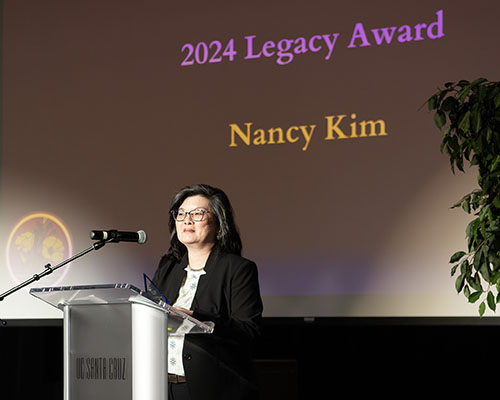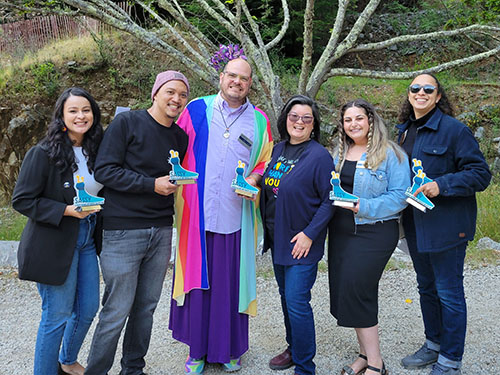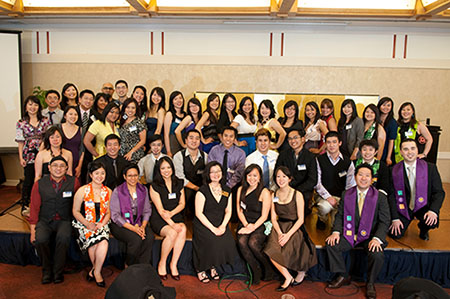Campus News
Championing inclusion: Nancy Kim’s leadership in UCSC’s resource centers
Nancy Kim graduated from UCSC in 1994, became the university’s founding Director of the Asian American/Pacific Islander Resource Center, and currently serves as the Executive Director of Resource Centers.



Nancy Kim (Merrill ’94, American studies)—an alumna, the founding Director of the Asian American/Pacific Islander Resource Center (AAPIRC), and a 25-year staff member—attended UCSC when its student population was half its current size. The university’s people of color (POC) population was roughly 25 percent, and its AAPI population was under 10 percent.
Now, three decades later, the AAPI population is one of the largest at the university, and the POC population makes up over 60 percent. Kim currently serves as the Executive Director of Resource Centers at UCSC, which includes the AA/PIRC, El Centro, the African American Resource and Cultural Center, the American Indian Resource Center, the Lionel Cantú Queer Center, and the Womxn’s Center.
“When I was a student at UCSC, I started to understand how student organizations and individuals can help impact change and serve the community,” Kim said. “When I graduated, I knew I wanted to work to help people and that higher education institutions would probably be a good fit for me.”
After graduating from UCSC in 1994, Kim became the Program Coordinator at the Asian American Resource Center at Pomona College and, at 23 years old, became the Interim Director. Afterward, she pursued her Master’s in Asian American Studies at UCLA and, in 1999, became the first Director of the AA/PIRC at UCSC.
“During that time, the students, staff, community, and faculty at UCSC were pushing for an Asian American and Pacific Islander Resource Center,” Kim said. “And so the timing worked out that after I graduated, I taught as a lecturer at various institutions, and then I was really fortunate to be offered this position.”
Early in her career, Kim’s goal was to foster a coalition model among UCSC’s six resource centers, ensuring they supported and uplifted one another. Through her leadership, she has cultivated an environment where students collaborate across identities, recognizing the interconnectedness of their experiences. Kim’s commitment to intersectionality has resulted in programming that celebrates diverse backgrounds and advocates for collective liberation. She has implemented internal policies and practices to promote consistency and inclusivity, laying the foundation for lasting change.
Among her accomplishments, Kim is most proud of establishing a framework within the AA/PIRC that prioritizes unity, amplifies the voices of marginalized communities, and sets the groundwork for those who followed her in the role.
One of her favorite things about being with UCSC for 25 years is seeing the growth of students and colleagues around her.
“Probably what gives me the most joy is getting to see growth in students from when they came in, so shy they couldn’t even look me in the eye and then becoming activists and leaders in the community,” Kim said. “Or former Program Coordinators who are now Assistant Directors, former Directors who are now Associate Dean, Assistant Vice Provost, Assistant Vice Chancellor. That’s where I get the joy—seeing former team members carry on resource center core values, motivation for change, committed to community, and expanding that reach. That’s what I’m most proud about.”
Kim recalls choosing to attend UCSC for her undergraduate education because she didn’t want the typical college experience. She was attracted to the university’s stunning landscapes, the use of narrative evaluations rather than letter grades, and its unique, welcoming community.
As a Korean American growing up in Claremont in Southern California, she didn’t feel particularly connected to her hometown, but UCSC felt accepting.
“At its core, I think UC Santa Cruz has a special acceptance of folks who don’t quite feel like they fit in,” Kim said. “And I think that’s pretty cool for us to have a space like that.”
Alumni can stay involved with UCSC’s Resource Centers by communicating with the Directors and staff—who are often alumni themselves—contributing to the creation of programs such as alumni panels, attending in-person events, and making gifts to further the centers’ impact.
“I think for alumni, particularly alumni of minoritized backgrounds, they feel the need to come back, give back, and support so that students have a better experience than they did,” Kim said. “I had a good student experience, but that was because of the community, student organizations, and individual staff and faculty I interacted with and mentored me.”
You can support any UCSC Resource Center during the campuswide crowdfunding campaign, Spring Give, this April 3.